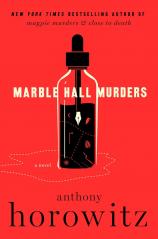Marble Hall Murders
Review
Marble Hall Murders
MARBLE HALL MURDERS marks the return of London books editor Susan Ryeland, who is working on a new Atticus Pünd novel, Pünd’s Last Case. Even though it could be read as a stand-alone, Anthony Horowitz makes it clear that there is a correlation to the prior books featuring Susan --- MAGPIE MURDERS and MOONFLOWER MURDERS --- and the solution to the Magpie Murders is revealed here.
Horowitz proudly states that he has committed more fictional murders than any other author alive today. This been achieved not only through his novels but also thanks to his work on the BBC shows “Midsomer Murders,” “Foyle’s War” and “Poirot.” I am happy to report that he increases the death toll nicely in his latest book.
"This mystery within a mystery is like a fictional Russian doll that will keep readers engaged and guessing on multiple levels from start to finish."
There is plenty of metafiction here as well, beginning with the name-dropping of Oscar-nominated actress Lesley Manville in the Acknowledgements. Horowitz says that it was Manville pushing for a third novel to continue the PBS series that prompted him to write under such a tight deadline. Throughout MARBLE HALL MURDERS, there are constant references to very real authors, as well as actors and actresses. It gives constant credibility and realism to everything that is going on.
Susan has been hired as a consultant by her former publisher to collaborate with young author Eliot Crace, who is taking over from the late Alan Conway in continuing the Atticus Pünd series. Since it already was mentioned in MOONFLOWER MURDERS that Conway's time was limited due to a cancer diagnosis, the not-so-clever title Pünd’s Last Case is used here.
As with the prior entries in the series, a good portion of the narrative is the nearly complete manuscript from Eliot that is being read by Susan. It must be said that Eliot comes from a wealthy and famous British family, having followed in the footsteps of his late grandmother, Miriam Crace, who had written the beloved children’s book series, The Little People. Eliot made it clear that he, his siblings, and everyone involved with Miriam hated her and the place they all occupied: Marble Hall. It should come as no surprise that Pünd’s Last Case is a mirror reflection of Eliot's own relatives and is filled with anagrams and clues that resemble his family matters. Most importantly, he claims that his terminally ill grandmother was actually killed by a member of the Marble Hall household.
Understanding that Eliot’s work reveals a very real murder makes Susan pore through the manuscript, trying to uncover the clues and match up the fictional characters to their real-life counterparts. She eventually finds herself not only in danger but also a suspect in one of the murders here. With her own life under the microscope, the book puts Susan in the most complex dilemma she has ever faced. There is so much here to appeal to mystery readers. As one character states, “Isn’t that the only reason to read a murder mystery? To get to the end?”
MARBLE HALL MURDERS is a masterpiece and more than a worthy successor to the prior installments of the series. The complex construction of Horowitz’s mysteries is so brilliant that it feels like he is channeling Agatha Christie herself, and this latest entry is a perfect example of this. This mystery within a mystery is like a fictional Russian doll that will keep readers engaged and guessing on multiple levels from start to finish.
Reviewed by Ray Palen on May 16, 2025



